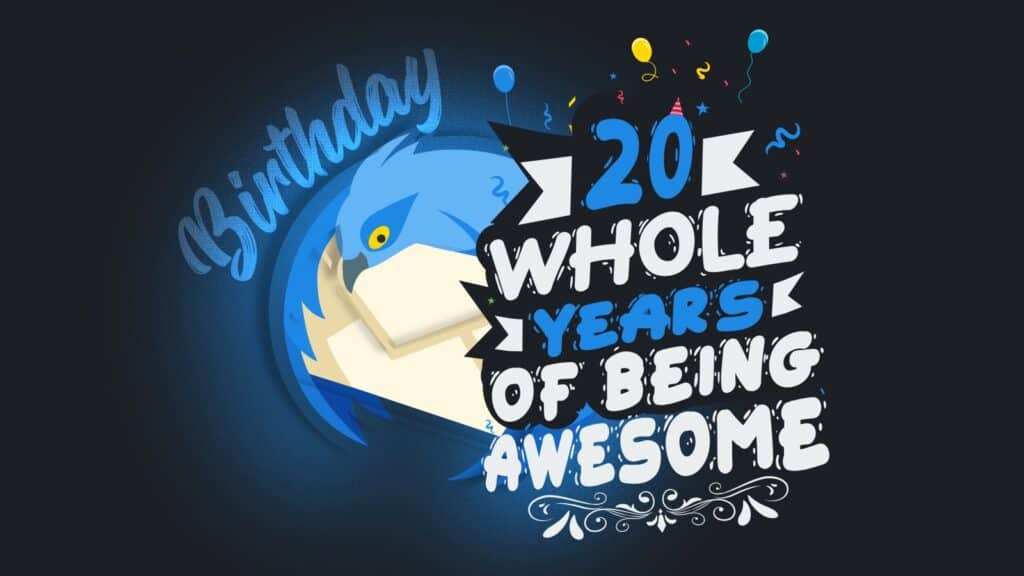On December 7, 2024, Thunderbird celebrates a monumental milestone: 20 years of empowering users worldwide. Over the past two decades, this open-source email client has become more than just a tool for managing inboxes; it has cemented its place as a trusted ally for those prioritizing privacy and control over their digital lives.
So, today seems like the ideal day to take a trip down memory lane and revisit some of the key milestones in the journey of this amazing mail client.
Its story officially began with the release of Thunderbird v1.0 on December 7, 2004, though its roots trace back to 2003 as an offshoot of the Mozilla project. At its inception, the software aimed to disrupt the dominance of proprietary email clients by offering an open-source, secure, and customizable alternative.
Many are probably not familiar with the fact that the name “Thunderbird” is not the original one with which the project started. It’s replaced its earlier working title, “Minotaur.”
From the outset, Thunderbird’s mission resonated with tech enthusiasts, system administrators, and privacy advocates. Its extensibility and robust features allowed users to tailor their email experience, quickly earning it a reputation as the “email app for those in the know.”
However, despite its strong start, Thunderbird’s path was far from smooth. The rise of web-based email services, such as Gmail—which coincidentally launched the same year—challenged traditional email clients. Additionally, funding hurdles and shifting priorities within Mozilla presented significant obstacles.
In 2012, Mozilla announced it would cease actively developing Thunderbird, leaving the project’s future uncertain. Yet, the community refused to let it fade away.
Dedicated developers, volunteers, and users rallied together, sustaining Thunderbird’s momentum through sheer passion and determination. Millions of users continued to rely on the platform, reaffirming its relevance and value.
A turning point came in 2017 when the Mozilla Foundation rehired a small team to focus on Thunderbird’s development. This team launched donation campaigns, emphasizing the importance of user support. Slowly but surely, Thunderbird began to regain its strength and chart a path forward.
The email client’s last few years have been transformative. In 2023, Thunderbird Supernova introduced a modernized user interface, breathing new life into the application. In 2024, the Nebula release addressed longstanding technical debt, paving the way for faster innovation.
Perhaps the most exciting development was Thunderbird’s expansion to mobile platforms. In 2022, Thunderbird acquired the open-source K-9 Mail project, which evolved into Thunderbird’s first-ever Android app.
But let me tell you—the best is yet to come! The Thunderbird developers are hard at work on some exciting new features that will soon be available to its countless loyal users. Among the highlights are built-in support for Microsoft Exchange, native Linux system tray support, customized account colors, a Folder Compression feature, native Windows 10/11 notifications, and more.
Finally, I just have to share this. People often criticize Thunderbird, saying its interface feels outdated and not aligned with today’s “modern” UI standards. Honestly, I couldn’t disagree more.
In the world of open-source email tools, no matter how many options pop up, one name consistently rises above the rest: Thunderbird. On a personal note, for the past 15 years, it’s been my trusted companion for all my desktop email needs. And believe me, I write a lot of emails. No single issue. I love it!
Happy 20th anniversary, Thunderbird! You’re gorgeous and amazing!

I have been using Thunderbird for most of the past 20 years. It is my go-to email client for both personal and business use. I am happy to donate to the project and I encourage other people to donate, too.
Thunderbird was kinda of OK until its notorious Ver. 115 came out which had an ugly interface and was not backward compatible with previous Thunderbird files. I want nothing to do with Ver. 115. Which is why I will continue to be a happy camper and use Ver. 68. Just like Firefox, which is not backward compatible, I'm glad I have other choices for browsers such as Waterfox, Pale Moon and a host of other browsers!
This is great! I started using Thunderbird when it was first released, and have been using it ever since. Even though I use it less often now, I am still grateful for all those who volunteered to save it from death several years ago. Here's to 20 more years!